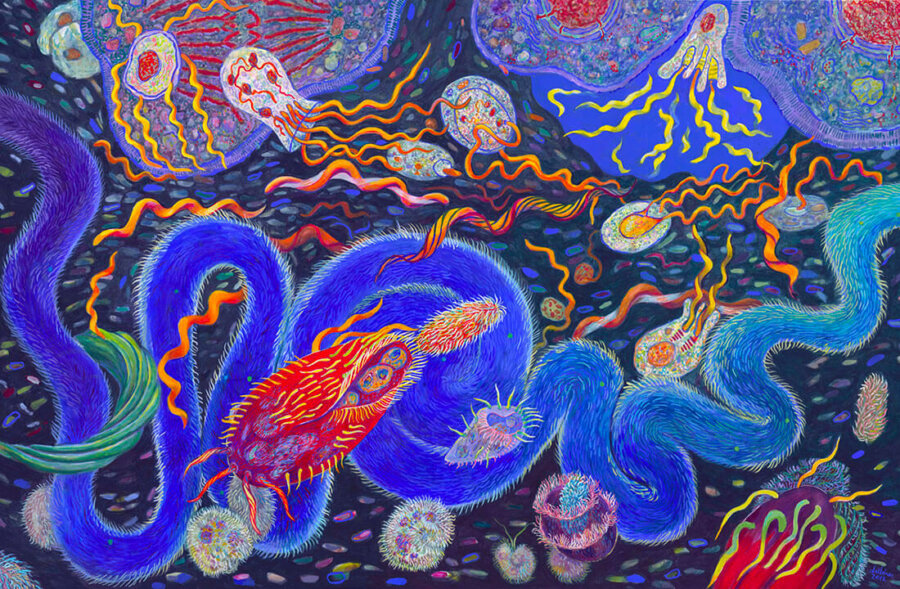
Event
Nature after…
Discussion around “À propos du Chthulucène et de ses espèces camarades”
Tuesday 13 March 2018 • 6:30 PM
Jeu de Paume – Paris
Jeu de Paume and the Fondation Gulbenkian in Paris are currently showing “À propos du Chthulucène et de ses espèces camarades” (online art space) and “Talismans” respectively. These two projects seem to partake of a shared reflection on nature and human history based on the assertion of hybrid knowledge that establishes no hierarchy between its constituent elements: scientific knowledge, collective beliefs and speculative fictions. The artistic projects selected here present a critical approach to alternative reality, different from the traditional historical discourses. The two institutions have come together to organise an evening of screenings and dialogues with two artists: Ana Vaz for the Jeu de Paume online art space, and Pedro Neves Marques for the Fondation Gulbenkian.
With:
Maria Ptqk, curator of the online exhibition “À propos du Chthulucène et de ses espèces camarades”.
Sarina Basta, curator of the exhibition “Talismans”.
Pedro Neves Marques, who will screen his film Linnaeus and the Terminator Seed (2017, 15′, in English, Portuguese subtitles) and talk with Teresa Castro, lecturer in film and audiovisual studies at the Sorbonne Nouvelle, Paris 3.
Ana Vaz who will screen her film Atomic Garden (2017, 7’16”, sound) and talk with Olivier Marboeuf, director of Espace Khiasma in Les Lilas (Paris area) and associate producer at SPECTRE.
Born in Lisbon and based in New York, artist and writer Pedro Neves Marques has exhibited at the Musée Colecção Berardo (Lisbon), Kadist Art Foundation (Paris), the Sculpture Center (New York) and the Museu Serralves (Porto). His first short fiction film, Semente Exterminadora, won a prize at the IndieLisboa Film Festival in 2017. An earlier short, Where to Sit at the Dinner Table?, was a prize-winner at the Doc Lisboa International Film Festival in 2013. He and fellow artist Mariana Silva run Inhabitants, a web channel for exploratory video and documentary reportage.
www.pedronevesmarques.com
Ana Vaz (Brazil, 1986) is an artist and filmmaker whose films and related works speculate on interpersonal relations and on the relation to myth and history, working with a cosmology of signs, references and perspectives. Assemblages of found or filmed materials, her films combine ethnography and speculation as they explore the frictions and fictions present in relations between cultivated and wild environments and their multiple inhabitants. Trained at the Royal Melbourne Institute of Technology and at Le Fresnoy Studio National des Arts Contemporains, Vaz was also a member of the SPEAP (Sciences Po, École des Arts Politiques) project conceived and directed by Bruno Latour. In 2015 she won the prize of the Kazuko Trust Award presented by the Film Society of the Lincoln Center in recognition of artistic excellence and innovation in the field of moving images.
https://vimeo.com/anavaz
Teresa Castro lecturer in film and audiovisual studies at the Sorbonne Nouvelle, Paris 3. Formerly a post-doctoral researcher at the Musée du Quai Branly and at the Max Planck Institute for the History of Science in Berlin, she is currently working on a book on plants and cinema.
Olivier Marbœuf is an author, critic, performer and independent curator, and director of Espace Khiasma since 2004. His work is articulated around the problematic of the relation between the text or voice and the fixed or moving image and, more generally, the issues of transmission. For some years now, his research has focused particularly on a rereading of colonialism based on the principles of narrative speculation that clashes with the dominant historical narrative. Closely involved in artists’ cinema, he is also associate producer at Spectre Productions and programmer for Phantom, a department of Khiasma.
In collaboration with the Fondation Gulbenkian, Paris.
Discussion and screenings, Tuesday 13 March 2018 at 6.30 pm in the Jeu de Paume auditorium.
Admission free, subject to capacity.
